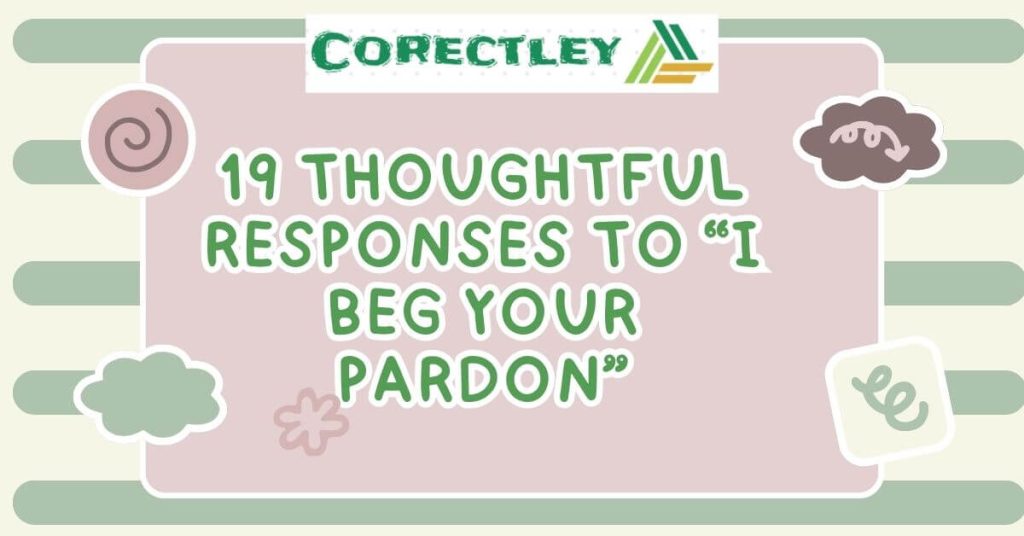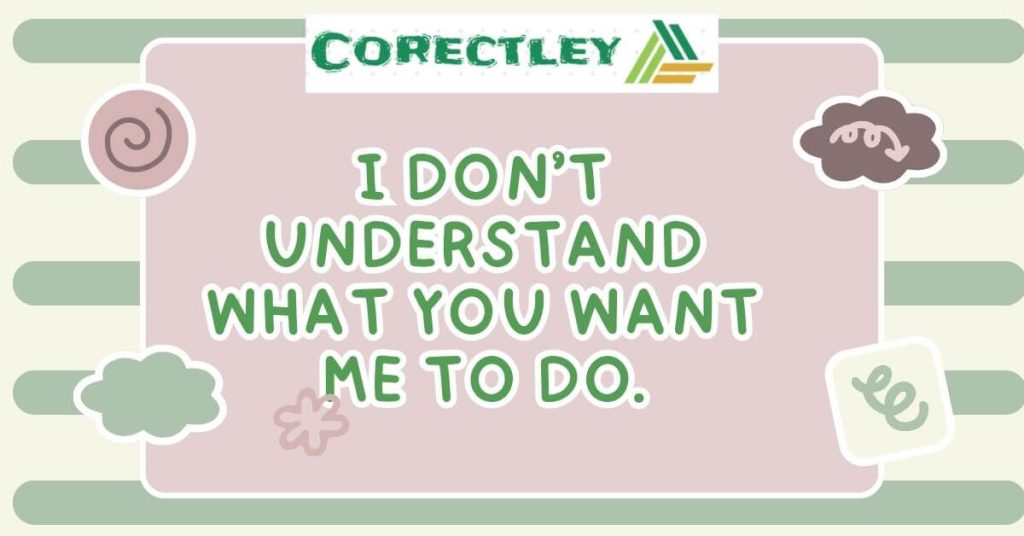The assertion I beg your pardon suggests numerous things, thusly, knowing how to answer accurately makes one’s message clear.
“I beg your pardon” could imply that the speaker believes you should rehash an assertion said beforehand or is attempting to point out a particular issue.
One thing is certain, “I beg your pardon” has more going on under the surface.
Today in this article, we will feature the 19 right responses to the assertion “I beg your pardon” and the motivations behind why these responses are reasonable.

19 Correct Responses to “I beg your Pardon?”
The twenty best responses to the statement “I beg your pardon” are listed below. These responses are only a small portion of the many that can be provided for this complex statement; they include:
1. Could you repeat that?
It is not a bad idea to ask someone to repeat what they had said; for clarity, this response is one worth using.
Might you at any point rehash that as a response to an, I beg your pardon proclamation signs to the speaker that their message wasn’t perceived and thus should be restarted?
To forestall any equivocalness, when somebody utilizes I beg your pardon after a remark has been said, the best response to give ought to be Could you repeat that?
2. Is this what you mean?
One more response that can be utilized to handle an I beg your Pardon proclamation, for the most part on the off chance that there is certainly not an obvious portrayal of an errand to be executed, ought to be is this what you mean?
By responding this way, the person tasked with carrying out a particular task has exercised discretion to avoid making a mess.
3. Shall we continue with the task at hand?
There could have been a respite in an undertaking because of strategic reasons, and after figuring that out, the errand remains forthcoming; the most ideal way to approach the work continuation is to enquire whether the action could go on.
In any case, if you get an I ask your exculpation proclamation previously or after asking, this response brings to the person in control the condition of the undertaking and why there is a need to finish it.
4. It’s alright, and I don’t hold it against you.
As expressed from the beginning of this article, the assertion “I beg your Pardon” has different implications according to the setting where it was said.
In this specific situation, the response above would be proper on the off chance that there had been a hidden issue of bad behavior requiring statements of regret.
For instance, when somebody wrongly blames one more for a wrongdoing, they are Guiltless as well.
If the situation depicted best fits the assertion, the response it’s okay, I don’t hold it against you will be reasonable.
Be that as it may, this response is possibly utilized if the blamed considers it fit to excuse an exoneration.
5. Is there anything I could do to help?
Utilized the response is there whatever I might do to help when the person being alluded to is hesitant to look for help.
A specific person has the propensity for not having any desire to open up to being not able to do specific things because of some limitation. In any case, looking to understand what they need is one method for having them assuage of their failure.
They are probably going to be monitored at first when offered assistance; at the second, third, and fifth endeavor, they will surrender to your proposal for assist with an I beg your Pardon.
6. How about you calm down?
This response is an idea for one to unwind, particularly during a contention or any strained circumstance.
While attempting to make sense of a thought and are met with resistance, an person gets unsettled and heightens what is happening.
At the point when the work to ease them won’t yield any outcomes, the best thing to do when they answer you is to recommend they have some time off.
7. Can we work things out?
In a setting where collaboration is focused on, the need to resolve any debate and move forward ought not be underestimated; Therefore, the most effective response to an “I beg your pardon” is to resolve the situation.
It’s OK to have a contention of thoughts in any climate with a different number of persons, yet when this contention undermines the group’s aggregate objective, there is a requirement for request.
Utilizing this response, the gatherings engaged with the spat have consented to make peace and will add to the association’s advancement.
8. I was only joking
Utilized in examples where one person prods another, the one being prodded answers with an I ask your exculpation, wherein the speaker demonstrates that they are just kidding.
Here is the situation wherein this response is much of the time carefree and where chitchats and senseless jokes come first.
Maybe the person being teased wants to know what the joke is all about, so they say, “I beg your pardon;” the response, in this situation, is to tell them that it was just a joke.
9. What do you mean by that?
It gets revolting when an activity or proclamation is abused; in this way, to drench the pressure, the need to understand what the assertion implies becomes appropriate.
In response to an “I beg your pardon” statement, what do you mean when you say that you want to clarify the context of the statement to bring attention to the person who made the original statement, which the other person might find insulting or demeaning? The fracture is settled.
10. Do you want answers?
The tension is made by giving the response: Do you need replies to the assertion? I beg your Pardon is one not every person will actually want to bear; for this reason giving this answer ought to be finished with care.
At the point when the response Do you need answers is given, an unobtrusive message is passed to the one requesting to take alert in their asking, particularly if the subtleties are not great to be discussed.
If the person asking the question doesn’t want their name to be dragged into the mud, they should refrain from asking further by responding in light of the response above.
11. I don’t understand what you want me to do.

For the well-being of clearness, the response above is appropriate at whatever point one is uncertain of the activity expected of them.
By opening up to not grasping the errand expected of a person, they give space for additional clarification and evasion of mix-ups liable to emerge from not inquiring.
12. I am sorry, it wasn’t my intention to be rude
I’m heartbroken. I didn’t intend to be discourteous. It is a solution to give assuming that one has not exactly in a good place with one more interestingly.
Perhaps they have inconsiderately remarked on their way of dressing, talking, or simply something that could make humiliation another.
At the point when next these people cross the way and one is looking for pardoning, then, at that point, this response is profoundly recommended.
13. You will be attended to shortly
Those in a proper climate will find the response you will be going to rapidly, particularly for a fretful client.
Because of the responsibility and the need to fulfill client’s needs, in some cases, different clients continue to stand by, and keeping in mind that they might have become irritated, one is probably going to get an I ask your absolution articulation.
The assertion is simply to realize the reason why they’re being deferred and assume that they ought to remain or get back later. The best response at this point will be to reassure them that assistance will be forthcoming.
14. It is beyond my capacity
At the point when the chances of doing an undertaking are stacked against you, it is legitimate to let whoever the occupation is for that it is basically impossible for you. This forestalls laments over the long haul.
However the response may not be lovely at first, better than accomplishing something could tell on your art, trustworthiness, and mental self-view.
Telling these people forehand that our powerlessness to do the obligation they need of you makes them look for an option prior before the due date of the venture finishing.
15. Never mind. I wasn’t talking to you
People are more likely to ask with an “I beg your pardon” when they are unsure if they are being spoken to.
If the speaker isn’t alluding to them, the best response is Don’t bother. I wasn’t conversing with you.
Whether the person really looks to be aware assuming that they are being alluded to or is being replied by the response.
If, running against the norm, the point was to jab nose, the answer, as it were, cautioned them forehand.
16. There is nothing we can do
Cold as this response might sound, it is the best way to tell one that work to rescue a breaking down circumstance has been depleted and have the beneficiary attempt elsewhere for an answer.
It very well may be an instance of a messed up relationship, a robbery that can’t be recuperated, and so on., Responding with “There’s nothing we can do” resolves the issue when someone repeatedly begs for your pardon.
It gives them the bump to attempt elsewhere or leave to the destiny of the condition; whichever they pick, you have answered best to their ask your-pardon proclamation.
17. It is just a compliment’
Not every person can separate between a commendation; furthermore, an insult; it is to your greatest advantage to illuminate it before they expect to be the opposite.
It is only a commendation as a response to your exculpation that defines the fine boundary between your audience expecting the most exceedingly terrible of your profound respect while causing them to loll in the esteem.
18. What do you suggest we do?
Nothing comes close to running out of thoughts. Tragically, everybody encounters an episode of vacancy, scholars, innovators, and specialists; everyone ultimately runs out of thoughts.
Luckily, we don’t all run out of thoughts all the while; for this reason, it is essential to look for one at whatever point that block hits.
The response: would it be that you recommend we do? Consider the way that one is lacking in motivation and thus sets expectations from another who is either a better or a partner than supports their imagination.
19. That was a ridiculous thing to do
When did you last observe something senseless? When did a dear companion last accomplish something off-kilter? How could you reprove them?
Your response may result in more harm than the correction intended if you take their behavior too personally; to this end, you should accept extraordinary consideration in answering in a manner not to cause disdain.
By bringing up to them smoothly the craziness of their activity, you clarify that you esteem their character as a companion and wouldn’t need them doing things that will make anybody disregard them.